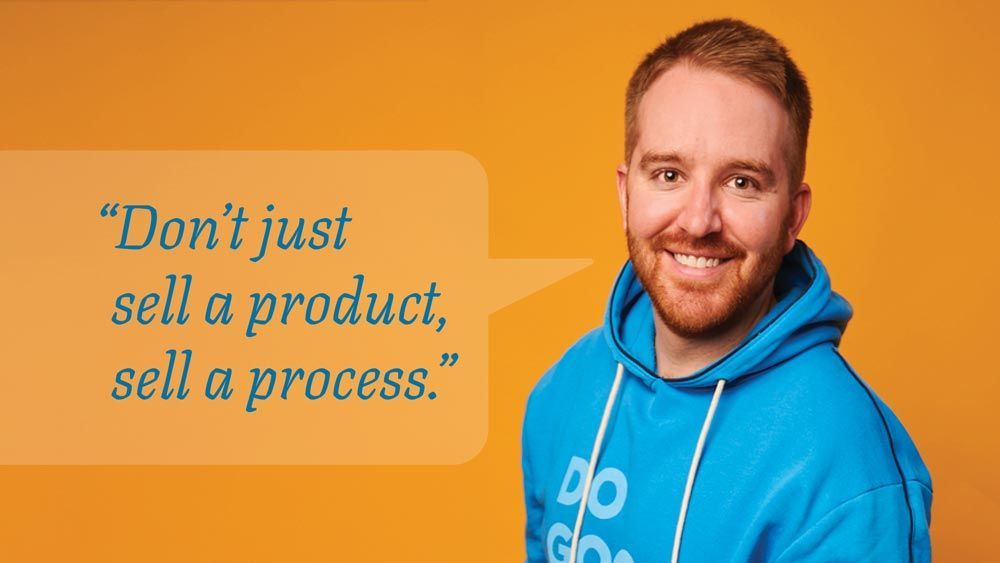Do People Care About Your Brand?
Buying a product from a company does not mean I want a lifelong relationship with your customer service department or brand.
Do people care about your brand? Can you really claim your brand cares about people? Do people want a relationship with your brand? Not likely. Then what does that mean for “relationship brands”?
Some transactions are meaningful because of how I feel when I use the product or service. Some transactions are just an exchange of money for goods. Don’t try to make a transaction more than the consumer wants it to be.
Don’t strive to be a relationship brand. Instead, be relational. Invite people to share experiences, join a community, and be part of a bigger story.
The heart of brand building is in being relational, which goes beyond inviting people into a story, participating in a program, or making a transaction. Brand building is collaborative and complementary, where the brand builder (your company) and brand owner (the consumer) walk together.
Marketing acts as a messenger to proclaim good news to people looking for help solving a problem or achieving a goal. Your brand is a beacon, a ray of light, representing what people imagine their life could be like if they make the right choice. That light represents hope — not in your brand — but in the consumer’s mind.
“The tribe will create the brand for you.” — Marty Neumeier
Branding is what you do to make the beacon — the light — shine brightly and attract people. Branding puts your light on a hilltop for all to see.
If you start with people’s needs and find a unique way to bring value to them, the rest takes care of itself. Your branding is a bridge from customers to your company. It speaks for you before they buy. Your branding expresses the core values you practice now, want to pass on after you, and want others to share with you. Your branding helps you create an identity attached to a set of core values, not a person, product, or organization.
“Branding is a way to get more people to buy more stuff for more years at higher price.” – Marty Neumeier
Do Consumers Love Your Brand as Much as You Think They Do?
In one sense, it’s not hard to understand what it means to be a relational brand. People love to buy stuff but hate being sold to. For that to happen, a company must focus on the core principle of relational brands — creating customers who build brands that sustain companies (most companies are still using an old brand model).
Companies invest billions of dollars in endearing their brands to people. Do people care about brands as much as companies think they do?
The Havas Group’s Meaningful Brands 2019 report, based on 1,800 brands and 350,000 respondents in 31 countries, uncovered a startling statistic: consumers said they wouldn’t care if 77% of everyday brands disappeared.
- 58% of respondents thought brands were providing poor and irrelevant content.
- 61% of respondents want brands to provide engaging, entertaining content and offer valuable experiences apart from the brand’s usual services.
“Brands’ failure to create relevant and meaningful content, combined with their inability to improve consumers’ well-being, means they are becoming increasingly irrelevant in the minds of shoppers.” writes Charlotte Rogers.
People care about what matters to them and what makes their life better. People care about their family, their health, the food they eat, and the house in which they live. Things like coffee, exercise, faith, and their pets make their life better.
How do companies associate what people care about with their brand?
People don’t care about brands; they care about how your brand makes them feel. It isn’t (and never was) about your brand.
Relational brands need to address basic human psychological needs, help people grow, and engage people in community. To grow your audience, messaging needs to focus on inspiring the heart and informing the mind. To empower people and help them grow, give them tools to apply what they learned. Build community and belonging so that people take action and engage.
“A brand’s biggest competition is flat indifference.” — Joe Parrish
People care about solving problems, achieving goals, being independent, loved, accepted, and involved. People desire safety, security, and being in control. People care about convenience, saving money, and status. People want to be part of a community. That’s why we refer to groups of people with similar beliefs and behaviors as tribes.
When those core motivations intersect with something your brand offers, then people might care. Understanding what consumers want makes the discipline of brand so maddeningly complex when it should be wonderfully simple.
Love Letter to a Brand
Dear Brand,
I want to feel like I noticed you.
I want to smile when I see you because we always have so much fun together, and you make me feel good about myself.
We can build something together.
I don’t want you following me around, “trying” to have a relationship with me, constantly showing up, or getting in my face.
If you’re in my inbox a lot, chances are, I’m getting annoyed by you.
So, help me out. Solve my issues, don’t become one of them.
—Sarah Phelps
Three Practices for Relational Brands
- Remember your purpose — the reason you’re in business beyond making money — to empower your team to create more customers.
- Don’t tell people that you are a relationship brand, be relational. Improve your customer service, keep your promises, stay true to your word.
- Implement narrative branding. What people believe about your brand (the gut feeling they have about your produce, service, or organization) Is driven by the words your brand uses and how it communicates in every brand touchpoint, design, marketing, and experience.
According to Bob Hoffman, this is how advertising really works:
“We don’t get them to try our product by convincing them to love our brand. We get them to love our brand by convincing them to try our product.”
– Bob Hoffman
For your business to flourish, your brand has to sustain your company. That only happens when you invite customers to create your brand with you.
For the record, I do love Piaggio's Vespa brand.
Brian Sooy is the first Level C Certified Brand Strategist and StoryBrand Certified Guide. Brian leads the Aespire branding agency and authors books and thought leadership to help leaders find clarity, focus teams, align culture, build brands, multiply impact, and build thriving businesses.
Do you have a hard time explaining what your company does or why your brand matters to people?
If you struggle to grow your business, you’re not alone. Aespire can help you create a clear message and brand that helps you grow your business. Contact us today for a consultation with a StoryBrand Certified Marketing Guide.
Get a Free Comprehensive Marketing Assessment
Stop hoping your marketing will sort itself out.
- Complete this free assessment in 15 minutes.
- Review your custom report (and schedule a 30-minute review) to diagnose what’s happening.
- Create an action plan to get your marketing back on track.







